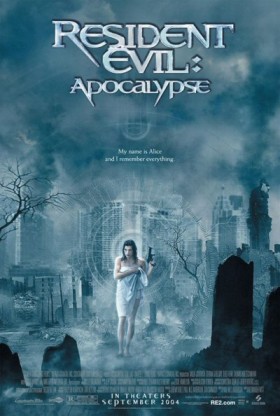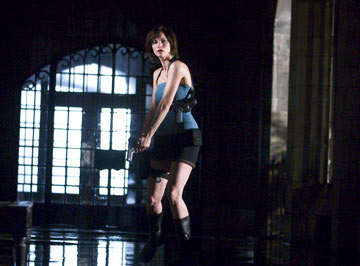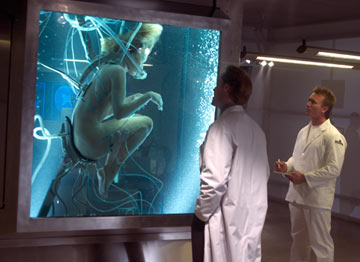|
Resident
Evil: Apocalypse
One must approach a film like Resident Evil: Apocalypse
with a certain sense of irony, and a willingness to throw
all logic, even zombie logic, out the window. The
irony here is resident in the film’s origins specifically.
Being the second adaptation from the popular Capcom video
game franchise, Apocalypse looks and feels more
like a video game than any of its Nintendo or Playstation
predecessors. This isn’t a compliment.
The
appeal behind the Resident Evil franchise stems from its
slow budding storyline, perverse scientific experiments
gone awry, and the sense of chilly isolation mixed with
investigative discovery. Oh yes, and the fact that you get
to blow zombie heads to smithereens.
Granted,
they are video games, and the cut scenes are notorious for
their stilted dialogue and cheesy demeanor. But they are
still wrapped up in a package that feels more organic than
anything present in Apocalypse. Unfortunately
for moviegoers, the crew responsible for the film couldn’t
corral enough of these aspects onto 35 millimeter to fill
the entire ninety-four minute runtime.
The
sequel picks up where the first installment left off. Milla
Jovavich’s Alice recounts the events leading up to
her rescue by bio-suit clad employees of the Umbrella Corporation,
her former employers and the culprits behind the T-Virus,
which in turn is responsible for the whole “zombie
issue.” What
follows is a pastiche of video game inferences consisting
of references to “The Nemesis Project,” the
introduction of Jill Valentine, and a layout to events surrounding
an outbreak in Raccoon City.
Throughout
this sequence, poor writing is quickly sutured and dressed
with CGI bandages. Set pieces are redundantly labeled with
on-screen tags as ardently overstated as “the only
entrance to Raccoon City” when a bridge, which never
factors into the plot later on, makes its first appearance.
Valentine,
played deftly by Sienna Guillory, should be the real focus
here. She was sorely missed in the first installment of
the series, replaced instead by Jovavich’s Alice,
a character created specifically for the film installments
of the series. Guillory plays Jill the way the whole film
should have referenced its game console origins. During
her patrol of a seemingly abandoned church, we are finally
dropped into look and feel that should have been present
the whole time.
It is
apparent that Guillory studied her video game counterpart’s
movements and mannerisms, and it works perfectly here. Her
early sequences are the most rewarding throughout the film.
This
approach is quickly abandoned with Alice’s re-emergence.
In what seems to be direct reference to 28 Days Later,
but was the ending of the first film, she awakens in an
abandoned hospital, ripping I.V.’s and tubing from
her body. She stumbles into the street and is framed by
a newspaper exclaiming “The Dead Walk” in homage
to Day of the Dead.
Everything
about Alice is overstated throughout the film. She is reduced
to a walking movie cliché, recalling Ripley from
the Alien franchise at times, and Nikita by way
of Point of No Return at others.
The
church sequence is quickly sullied with the arrival of bloody
CG toad monsters with whip-like tongues. Alice, with no
apparent motive or reasoning, crashes through a stained
glass window on a motorcycle and assumes the role of Neo
to dispatch of her enemies. The whole thing is yawn inducing.
It was,
however, amusing to hear Jill question Alice, “Who
the hell are you?” When the film takes this approach,
it seems to shine momentarily through all of the murkiness.
In another
sequence of intended self-reference, L.J. (played by Mike
Epps) is racing down the street in his Cadillac. He sees
a zombie in the middle of the road and slams on the gas
yelling “GTA mother F-er!!” It’s silly,
but it works.
When
a plot finally emerges, it turns out to be nothing more
than the typical “rescue for hire” type scenario.
One of the T-Virus creators, the one “with a heart,”
anxiously awaits being reunited with his daughter, who is
trapped inside the quarantined Raccoon City. He
monitors all activity from his laptop, with which he hacked
the main system using a prompt titled “c:hack_search\.”
He contacts
Alice and company to act as his couriers. The logistics
alone in setting up enough cameras to allow the type of
coverage he has access to is not even worth dwelling on.
Instead, just laugh and try to suspend disbelief.
An evil
super monster is released to counter Jovavich’s super-Alice,
and this is of course the result of the Nemesis Project.
Nemesis has no real powers other than the ability to wield
heavy artillery and moan loudly. He is essentially ED-20Nemesis.
The
film boils down to a multiple ending conundrum apparent
in most troubled video game tie ins. A Mortal Kombat-esque
sequence between Alice and Nemesis, then multiple explosions
provide the prerequisite climactic titillation.
Was
the film terrible? In some ways, yes. Was it enjoyable?
At times.
Altogether
Resident Evil: Apocalypse is a formidable step
up from the first installment, but nowhere near as enjoyable
as its game console beginnings.
Rating:

|








